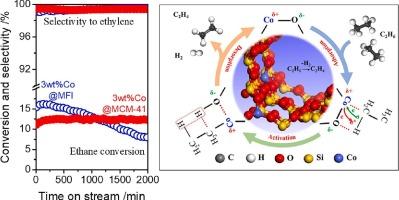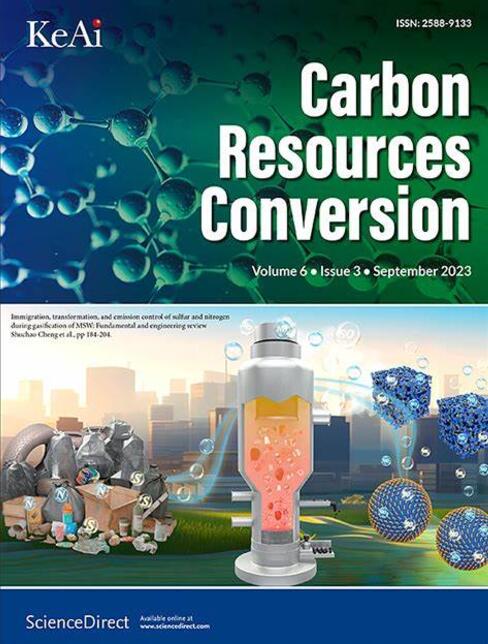介孔Co@MCM-41乙烷稳定脱氢催化剂
IF 7.5
3区 环境科学与生态学
Q2 ENERGY & FUELS
引用次数: 0
摘要
低成本的C2-C4烷烃催化脱氢可作为生产高附加值烯烃的替代途径。为克服微孔co基Co@MFI沸石催化剂对焦炭沉积敏感的失活缺点,采用水热合成方法成功合成了介孔co基MCM-41催化剂,并进行了乙烷脱氢试验。各种表征表明,Co物种也分散在MCM-41分子筛的原子水平上,具有抗还原-Coδ + -Oδ -结构,因此确保了其对乙烯的高选择性(~ 100%)。由于MCM-41的介孔特性,合成的Co@MCM-41催化剂比广泛报道的微孔Co@MFI催化剂表现出优异的稳定性,这可能是由于介孔通道对焦炭沉积不敏感,仍然允许反应物和生成物容易扩散进出。这项工作证明了沸石基催化剂扩散的重要性,促进了co基催化剂在烷烃脱氢中的应用。本文章由计算机程序翻译,如有差异,请以英文原文为准。

Mesoporous Co@MCM-41 catalyst for stable ethane dehydrogenation
Catalytic dehydrogenation of low-cost C2-C4 alkanes can be an alternative route to produce value-added olefins. To overcome the drawback of a microporous Co-based Co@MFI zeolite catalyst that is sensitive to coke deposition for its deactivation, herein, a mesoporous Co-incorporated MCM-41 catalyst was synthesized by hydrothermal synthesis successfully and tested for ethane dehydrogenation. Various characterizations suggested that Co species were also dispersed in an atomical level in the MCM-41 zeolite with a reduction-resistant –Coδ+–Oδ-– structure, which, therefore, ensures its high selectivity to ethylene (∼100 %). Thanks to the mesoporous characteristic of the MCM-41, the as-synthesized Co@MCM-41 catalyst showed excellent stability than the widely reported microporous Co@MFI catalysts, which can be attributed to the reason that the mesoporous channels are not sensitive to coke deposition and still allow reactant and products to diffuse in and out easily, This work demonstrates the importance of the diffusion of a zeolite-based catalyst and promotes the application of Co-based catalyst for alkane dehydrogenation.
求助全文
通过发布文献求助,成功后即可免费获取论文全文。
去求助
来源期刊

Carbon Resources Conversion
Materials Science-Materials Science (miscellaneous)
CiteScore
9.90
自引率
11.70%
发文量
36
审稿时长
10 weeks
期刊介绍:
Carbon Resources Conversion (CRC) publishes fundamental studies and industrial developments regarding relevant technologies aiming for the clean, efficient, value-added, and low-carbon utilization of carbon-containing resources as fuel for energy and as feedstock for materials or chemicals from, for example, fossil fuels, biomass, syngas, CO2, hydrocarbons, and organic wastes via physical, thermal, chemical, biological, and other technical methods. CRC also publishes scientific and engineering studies on resource characterization and pretreatment, carbon material innovation and production, clean technologies related to carbon resource conversion and utilization, and various process-supporting technologies, including on-line or off-line measurement and monitoring, modeling, simulations focused on safe and efficient process operation and control, and process and equipment optimization.
 求助内容:
求助内容: 应助结果提醒方式:
应助结果提醒方式:


